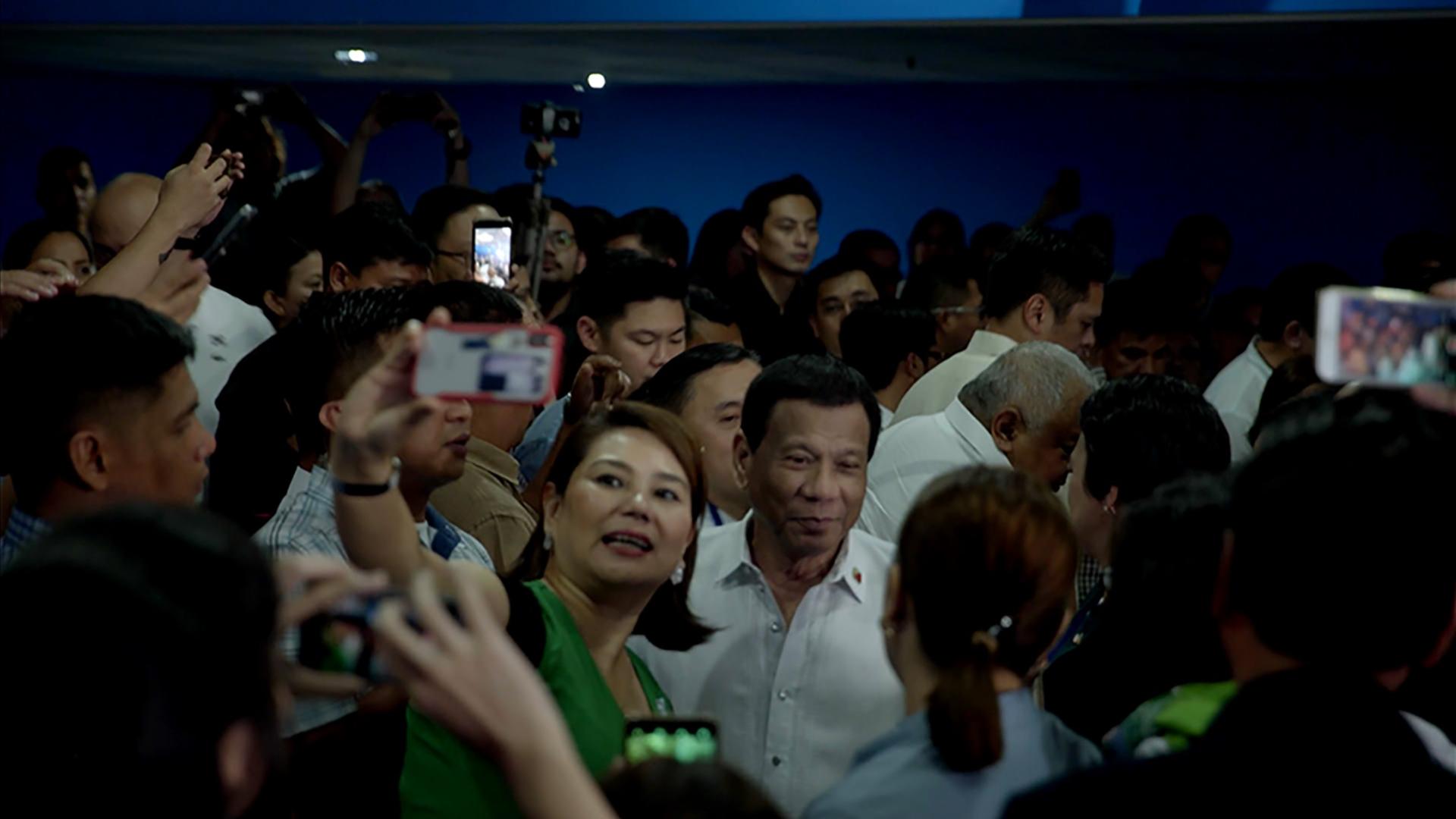

Nowhere is the worldwide erosion of democracy, fueled by social media disinformation campaigns, more starkly evident than in the authoritarian regime of Philippine President Rodrigo Duterte. Journalist Maria Ressa places the tools of the free press—and her freedom—on the line in defense of truth and democracy.
Our notes: Parallels are easy to observe between president of the Philippines Rodrigo Duterte and disaster-in-chief Trump, who both offer empty swagger and braggadocio as their modus operandi and give little in the way of substantive leadership. Instead, using their willingness to stoop to any low of inflammatory rhetoric, they draw attention away from their lack of ability and wield the power of their respective offices to encourage violence and bully their dissenters. In this riveting new documentary from Baltimore’s Ramona Diaz, we glimpse a closer look at the shameful extent of Duterte’s campaign against journalist Maria Ressa and her team at Rappler, a woman-run online news website.
Who can hold these men accountable when their partisan allies will not and their political opponents do not. In a healthy democracy, the media can and does take on this role of checking and balancing those in power, but in the ugly world of Trump and Duterte, flagrant violations of freedom of the press are becoming de rigeur. Both leaders seek to discredit any media that doesn’t care to spread their propaganda, while offering exclusive access to their respective state approved press outlets to try to spread disinformation and sow the seeds of divisiveness.
The key difference (for now at least) is that Duterte has an armed cadre of thugs to do his bidding—murdering with impunity—that don’t seem to be accountable to anyone but Duterte himself and his violent whims. He further erodes the press through bogus laws and a stacked court system willing to prosecute reporters for sharing news that counters the official narrative of his regime, regardless of the facts. The very survival of the Philippines free press is in question, as Duterte repeatedly and specifically targets Ressa and Rappler—an outlet that doesn’t have state ties or big business backing to skew their coverage. Their quest to report the truth and counter state narratives comes with the price of arrest and threats of violence, incited by Duterte and enacted by his rabid followers.
With unprecedented access to both Rappler’s alarming story and the current political turmoil ravaging the Philippines, Diaz’s camera follows Ressa and the Rappler crew on the ground as they fight for the survival of a free press and their very own right to stay alive amid the constant threats. As we observe Ressa’s travels to broadcast their story around the world, we see how their fight has clear implications for our journalists here in the U.S. and internationally. Expertly crafting a breathtakingly urgent story, Ramona Diaz’s A Thousand Cuts is required viewing. –Scott Braid & Mitchell Goodrich, MdFF
- Year2020
- Runtime115 minutes
- CountryUnited States, Philippines
- DirectorRamona S. Diaz
- ScreenwriterRamona S. Diaz
- ProducerRamona S. Diaz, Leah Marino, Julie Goldman, Chris Clements, Carolyn Hepburn
- Executive ProducerDavis Guggenheim, Jonathan Silberberg
- CinematographerGabriel Goodenough, Jeffrey Johnson
- EditorLeah Marino


Nowhere is the worldwide erosion of democracy, fueled by social media disinformation campaigns, more starkly evident than in the authoritarian regime of Philippine President Rodrigo Duterte. Journalist Maria Ressa places the tools of the free press—and her freedom—on the line in defense of truth and democracy.
Our notes: Parallels are easy to observe between president of the Philippines Rodrigo Duterte and disaster-in-chief Trump, who both offer empty swagger and braggadocio as their modus operandi and give little in the way of substantive leadership. Instead, using their willingness to stoop to any low of inflammatory rhetoric, they draw attention away from their lack of ability and wield the power of their respective offices to encourage violence and bully their dissenters. In this riveting new documentary from Baltimore’s Ramona Diaz, we glimpse a closer look at the shameful extent of Duterte’s campaign against journalist Maria Ressa and her team at Rappler, a woman-run online news website.
Who can hold these men accountable when their partisan allies will not and their political opponents do not. In a healthy democracy, the media can and does take on this role of checking and balancing those in power, but in the ugly world of Trump and Duterte, flagrant violations of freedom of the press are becoming de rigeur. Both leaders seek to discredit any media that doesn’t care to spread their propaganda, while offering exclusive access to their respective state approved press outlets to try to spread disinformation and sow the seeds of divisiveness.
The key difference (for now at least) is that Duterte has an armed cadre of thugs to do his bidding—murdering with impunity—that don’t seem to be accountable to anyone but Duterte himself and his violent whims. He further erodes the press through bogus laws and a stacked court system willing to prosecute reporters for sharing news that counters the official narrative of his regime, regardless of the facts. The very survival of the Philippines free press is in question, as Duterte repeatedly and specifically targets Ressa and Rappler—an outlet that doesn’t have state ties or big business backing to skew their coverage. Their quest to report the truth and counter state narratives comes with the price of arrest and threats of violence, incited by Duterte and enacted by his rabid followers.
With unprecedented access to both Rappler’s alarming story and the current political turmoil ravaging the Philippines, Diaz’s camera follows Ressa and the Rappler crew on the ground as they fight for the survival of a free press and their very own right to stay alive amid the constant threats. As we observe Ressa’s travels to broadcast their story around the world, we see how their fight has clear implications for our journalists here in the U.S. and internationally. Expertly crafting a breathtakingly urgent story, Ramona Diaz’s A Thousand Cuts is required viewing. –Scott Braid & Mitchell Goodrich, MdFF
- Year2020
- Runtime115 minutes
- CountryUnited States, Philippines
- DirectorRamona S. Diaz
- ScreenwriterRamona S. Diaz
- ProducerRamona S. Diaz, Leah Marino, Julie Goldman, Chris Clements, Carolyn Hepburn
- Executive ProducerDavis Guggenheim, Jonathan Silberberg
- CinematographerGabriel Goodenough, Jeffrey Johnson
- EditorLeah Marino